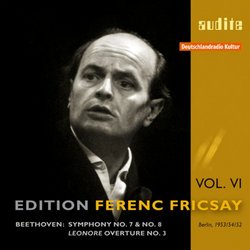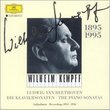| All Artists: Beethoven, Fricsay, Rias Symphony Orchestra Title: Beethoven: Symphonies Nos. 7 & 8 / Leonore Overture No. 3 Members Wishing: 0 Total Copies: 0 Label: Audite Original Release Date: 1/1/2008 Re-Release Date: 12/9/2008 Genre: Classical Styles: Historical Periods, Classical (c.1770-1830), Symphonies Number of Discs: 1 SwapaCD Credits: 1 UPC: 422143955939 |
Search - Beethoven, Fricsay, Rias Symphony Orchestra :: Beethoven: Symphonies Nos. 7 & 8 / Leonore Overture No. 3
 | Beethoven, Fricsay, Rias Symphony Orchestra Beethoven: Symphonies Nos. 7 & 8 / Leonore Overture No. 3 Genre: Classical
|
Larger Image |
CD DetailsSimilar CDs |
CD ReviewsAnother fine Fricsay reissue, but not outstanding Santa Fe Listener | Santa Fe, NM USA | 01/24/2009 (4 out of 5 stars) "Fricsay is a favorite of mine, so it's great that the German label Audite has begun its own historical Fricsay Edition, which also contains a wonderful 'Fledermaus' from 1949. His first season with the orchestra of the Berlin RIAS (Radio in the American Sector) was 1950, and these studio recordings, made in the same church where Karajan recorded his first Beethoven cycle with the Berlin Phil., date from that first engagement. The sound is unblemished mono that is more listenable than, say, Toscanini's on RCA from the same period, although the miking is distant and the treble somewhat dull. The orchestra always played well for Fricsay, and it does here.
Innately Fricsay favored fairly fast, lean, energetic Beethoven readings, especially for that era. He was in the forefront of the same modern style that Karajan would make famous in his 1962-63 cycle for DG. These players aren't nearly as good as Karajan's, and Karajan's dramatic conception was closer to Toscanini's riveting, tense interpretations than what we have here. Even so, this Seventh and Eighth Sym. sound very similar to Karajan's mono version form London with the Philharmonia on EMI, which dates from several years later. A few performance details: In the Seventh Fricsay takes the Allegretto almost at period-style speed and keeps it very light. In the Scherzo he takes the Trio a tempo instead of slowing down, as almost every other German conductor would have. The finale is crisp and clipped but not as excitingly pellmell as Karajan's. The orchestra is tested in te scurrying string parts, and the recording's shallow bass is a detriment. Overall, I am holding back one star because of a lack of dynamism and impact. The Eighth is given a middle-of-the-road reading as far as tempo goes, but Fricsay's flexible phrasing is warmly affectionate, which is welcome. The Scherzo is lighter and faster than usual for the time, and the finale is sprightly, if a bit taxing on the violins in fast passage work. The Leonore No. 3 stands as Beethoven's greatest overture; it calls for a supreme reading. Fricsay's is good but lacks the fire one finds in his Ninth Sym. on DG. In all, the absence of fire disappointed me throughout, yet on its own terms this is a welcome memento of an acclaimed conductor whose Beethoven is always worth hearing." |

 Track Listings (11) - Disc #1
Track Listings (11) - Disc #1